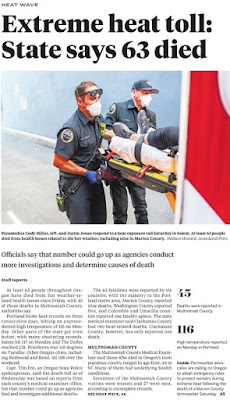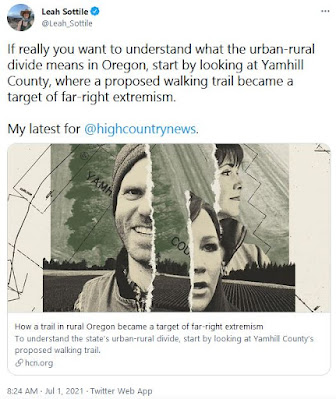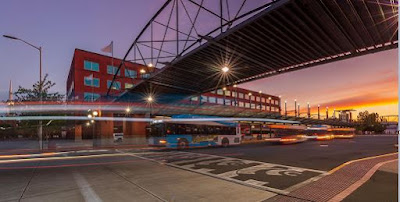Even with the Capitol Putsch of January 6th and with the second year of the Pandemic, a year in which national stories resonated powerfully as local stories also, the Heat Dome was the story of the year.
 |
| Even in Nebraska, 117 was remarkable |
113 and 117. Death Valley level heat right here in the Willamette Valley the end of June. High summer was a month away still. All-time record heat, an outlier sure for now, but also a harbinger of warming to come in the years and decades ahead, was the outstanding moment in 2021. (There was also the February ice storm, but even as bad as it was, it was not the same kind of outlier.)
 |
| An early undercount Oregonian, July 1st |
In that context, it was disappointing that the Climate Action Plan was not stronger. The draft came out in the fall, and the gas lobby mobilized home builders, developers, and business groups to create static and oppose reducing our use of gas heat and cooking. Our driving habit, the largest source of emissions, did not get enough attention, nor our land use. More directly on land use, Our Salem (including the middle housing code compliance package) also was not as strong as it could have been, and the City shied away from deeper climate action in it. Neither plan seems fully adequate to the gravity of our moment.
Even if we are not yet responding as well as we might, climate was less fringey, was more centered, and began to structure our debates. From here, even with all the other mess and dread, climate was the main story.
Pandemic and Politics
The Pandemic, still, was a close second. So much loss and disruption. So many dead, nearing a million now. With the distortions caused by the Pandemic, the need to respond continually to it, and the grief both generalized nationally and immediately for friends and family, it is still difficult to assess the year gone by.
The development of vaccines was amazing, but it was also politicized, and what should have been a politically neutral triumph of public health is now a contested site in our decline to competitive authoritarianism. Because of political intransigence and posturing, we missed our chance to eradicate it. It is impossible to consider things locally without this context.
 |
| Not just a mob, but a coup attempt |
 |
| via Twitter and HCN |
In the annual Bloomberg "Jealousy list," stories reporters were "jealous of" and wished they had written, one reporter cited Leah Sottile's story about the Yamhelas-Westsider trail and right-wing extremism. It is illuminating as a story about transportation, about our reactionary moment and the issues reactionaries target, and about a candidate for governor who is also current Yamhill County Commissioner. It's not directly about Salem, but it touches on so many local issues.
Building and Development
In light of climate, politics and covid, it's hard to give local stories their due. From here, partial approvals for the apartments at the former Nordstrom building (and here) signal another important moment in the transformation of downtown and seem most significant.
There were other notable projects in process, of course, but they will be bigger stories when they are completed. Outside of downtown construction of the Jory Apartments at the former State Hospital is a real milestone.
Transportation
We do not yet have all the systems in place to make the bike rental program, Ride Salem, a significant part of the downtown transportation mix. At the moment it's still a tiny, recreational amenity whose total use rounds to zero, more symbol than substance. But it was notable it restarted this summer. It is possible that its persistence will mean at some future point it becomes meaningfully usable for large numbers of people.
Councilor Stapleton made a bold move to open Union and Winter Streets near the Saturday Market to people walking and biking and to close them to cars and drivers. This was an important experiment, and it will be very interesting to see how it might return next year. People who had not already been advocates were surprised by the amount of aggressive driving they saw, and it may be that the appetites of drivers and cars for space, a constantly encroaching autoism (and on media expressions of that), was newly visible and will better inform policy in 2022.
 |
| Near the Summer Solstice at 9pm - via Cherriots |
Cherriots started Sunday service in September, giving Salemites seven day transit finally.
With so many dead of Covid, an order of magnitude greater, it is often hard to focus on traffic deaths, but over the last five years there is a steadily increasing number of people killed. This also is a national story, with nearly everywhere showing the trend, and the national totals trending up.
 |
| Oregonian, beginning of December |
I do not track walking and biking deaths in a statistically valid way - I wanted to remember a bus driver here for example - but the overall trend in the last five years is clear. In 2017, I tracked three whom drivers killed. Each year since the toll has increased.
Killed in 2021
- Unknown person (I-5 and Market Street interchange)
- Rachel Bunting (while operating a bus for Cherriots)
- Blake Saville (on bike)
- Christian Kennedy (on Silverton Road)
- Galina Dvorskaya (south Commercial)
- Marlene Moreno (downtown crosswalk)
- Becky Dietzel (on North River Road)
- Unknown person (on Church St downtown)
- Aleta Pierre-Kelly (Mission Street)
- Eileen Johnson (on bike)
- Unknown person (on bike crossing Salem Parkway)
- Anthony Garza (on bike, crossing I-5)
- Christine Klug (on I-5)
Some Positive Notes
One adaptation to the Pandemic that was not unambiguously awful, that had some very positive and creative elements, was the move to outdoor street dining and parklets (and here).
The City also successfully defended and then signed 17th Street for 25mph its whole length, and that could be a harbinger of a better approach to urban driving speed.
The Library reopened. The City Librarian, who had initiated the aggressive weeding program and closed the reference desk back in 2018, this year also had a "hot mic" moment and spoke intemperately in emails to staff and resigned. Hopefully the next Librarian will be more kind and also have a better sense for the value of old media like books and of older, trained librarians who know stuff. With the prospect of improvements to Peace Plaza and City Hall, as well as increasing calls for starting a branch system, the Library has great potential for an exciting new phase.
We live in complicated times, and you will think of other stories, or have a different shape to the way you understand the year. There are many important stories, so many things are confusing, and it will be interesting to read other lists and other summations and assessments.
Here and at this moment, climate, the struggle against reactionary extremism, and covid seem like the most significant, even though they are not strictly local stories. Loss now, expectations for future loss, and the seemingly futile struggle against the worst of it, were a dominant note in 2021.
Here's hoping for a 2022 that is less grim.
Previous notes on the Year in Review here.


No comments:
Post a Comment